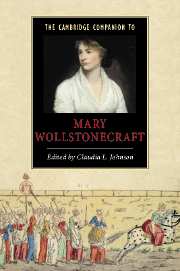Book contents
- Frontmatter
- 1 Introduction
- 2 Mary Wollstonecraft's letters
- 3 Mary Wollstonecraft on education
- 4 Mary Wollstonecraft's Vindications and their political tradition
- 5 Mary Wollstonecraft's French Revolution
- 6 Mary Wollstonecraft's literary reviews
- 7 The religious foundations of Mary Wollstonecraft's feminism
- 8 Mary Wollstonecraft and the literature of advice and instruction
- 9 Mary Wollstonecraft's A Vindication of the Rights of Woman and the women writers of her day
- 10 Mary Wollstonecraft and the poets
- 11 Mary Wollstonecraft's novels
- 12 Letters Written During a Short Residence in Sweden, Norway, and Denmark: traveling with Mary Wollstonecraft
- 13 Mary Wollstonecraft and the sexuality of genius
- 14 Mary Wollstonecraft's reception and legacies
- Select bibliography
- Index
6 - Mary Wollstonecraft's literary reviews
Published online by Cambridge University Press: 28 May 2006
- Frontmatter
- 1 Introduction
- 2 Mary Wollstonecraft's letters
- 3 Mary Wollstonecraft on education
- 4 Mary Wollstonecraft's Vindications and their political tradition
- 5 Mary Wollstonecraft's French Revolution
- 6 Mary Wollstonecraft's literary reviews
- 7 The religious foundations of Mary Wollstonecraft's feminism
- 8 Mary Wollstonecraft and the literature of advice and instruction
- 9 Mary Wollstonecraft's A Vindication of the Rights of Woman and the women writers of her day
- 10 Mary Wollstonecraft and the poets
- 11 Mary Wollstonecraft's novels
- 12 Letters Written During a Short Residence in Sweden, Norway, and Denmark: traveling with Mary Wollstonecraft
- 13 Mary Wollstonecraft and the sexuality of genius
- 14 Mary Wollstonecraft's reception and legacies
- Select bibliography
- Index
Summary
Although they constitute a substantial portion of her writing, the reviews Mary Wollstonecraft wrote for Joseph Johnson's progressive journal, the Analytical Review (launched in 1788), rarely receive sustained critical attention. This omission is unfortunate, for these reviews collectively testify to the breadth of Wollstonecraft's reading and to the extent of her activity within the literary marketplace of her time. As such they are a valuable resource for and index to her opinions during perhaps the most decisive and yet also the most neglected period of her career. But just as importantly, the reviews deserve close attention because they show us how Wollstonecraft developed her own distinctive voice as a feminist cultural critic by engaging with the texts under review. The reviewing experience thus simultaneously educated the private, anonymous writer and her reading audience. As Wollstonecraft learns and teaches, she also moves from tentative confessional author to the authoritative public figure who altered the social, political, and literary sphere during the transitional period of the 1790s.
Wollstonecraft served her literary apprenticeship as a reviewer for the Analytical Review and worked again as a journalist in her latter years when she was on the verge of artistic maturity. Interestingly, then, her reviews of poetry and popular romance cluster around the periods when she was herself most intensely involved in creative activity.
- Type
- Chapter
- Information
- The Cambridge Companion to Mary Wollstonecraft , pp. 82 - 98Publisher: Cambridge University PressPrint publication year: 2002
- 5
- Cited by



